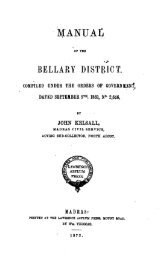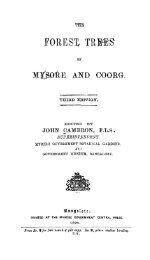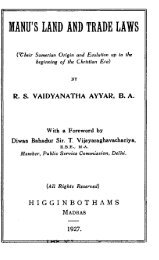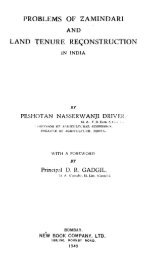You also want an ePaper? Increase the reach of your titles
YUMPU automatically turns print PDFs into web optimized ePapers that Google loves.
PAHT I<br />
mOGHAPHICAL AND IIISTORICAL
16<br />
rURGOr ,'/NiJ TilE SIX EVICTS<br />
011 tbe death of <strong>the</strong> king- <strong>and</strong> <strong>the</strong> acccs:-;ion of Lotlls XVI,<br />
<strong>Turgot</strong> was called to <strong>the</strong> Council of State as ;\linistcr of Marine;<br />
after out a month ill this service, <strong>the</strong> king sumllloned<br />
him to <strong>the</strong> Illost important work,
zo T('J which I addressed<br />
to <strong>the</strong>m concerning <strong>the</strong> economic condition <strong>and</strong> constitution<br />
of <strong>the</strong>ir empire.'" As an economic primer for foreigners<br />
whose minds were of necessity almost a blank concerning <strong>the</strong><br />
topics of most absorbing interest in <strong>the</strong>ir strange surroundings,<br />
<strong>the</strong> R!jlt;riolls would serve an admirable purpose.C And <strong>the</strong>re<br />
is every reason to sec why <strong>Turgot</strong>, who was almost continuously<br />
abscnt from Paris <strong>and</strong> busy with his work as Intcndcnt<br />
in Limousin, would attempt to make <strong>the</strong>se foreign youths<br />
acquainted with <strong>the</strong> doctrines of thc Physiocrats, by whom<br />
<strong>the</strong>y were surrounued in Paris, <strong>and</strong> to withold from <strong>the</strong> instruction,<br />
in large measure, <strong>the</strong> points of radical difference<br />
betwecn himself <strong>and</strong> <strong>the</strong> Physiocrats, <strong>and</strong> which could not well<br />
be elaborated within reasonable space, <strong>and</strong> especially for those<br />
whose minds were largely a blank on thc economic topics so<br />
rife in Paris. -;<br />
The primary purpose of <strong>the</strong> Rtjlt'xions was to equip <strong>the</strong><br />
Chinese to impart information intelligibly, ra<strong>the</strong>r than to<br />
impart economic information to <strong>the</strong>m. In a letter to Caillard.<br />
written in 1\1ay, 1774, <strong>Turgot</strong> explains to his friend that in <strong>the</strong><br />
proposed translation of <strong>the</strong> R(l/exiolls into German, <strong>the</strong>y ought<br />
properly to be introduced by a preface in which it should be<br />
stated that" <strong>the</strong> pamphlet was not intended for <strong>the</strong> public but<br />
to serve as a preamble to questions concerning <strong>the</strong> economic<br />
constitution of China, <strong>and</strong> addressed to two Chinese whom it<br />
was desired to put in condition to reply to <strong>the</strong> questions; <strong>and</strong><br />
that that letter having been confided by <strong>the</strong> author to M, Du<br />
Ilhire, fEuvrtl dt Turrol, vol. ii, p. 802.
TUI!GOT AND Till! SIX EDICTS<br />
issued a series of four bulls looking to <strong>the</strong> formation of a perpetual<br />
league of <strong>the</strong> French Clergy against <strong>the</strong> King. Failing<br />
again, Boniface issued ano<strong>the</strong>r bull in <strong>the</strong> following year<br />
censuring <strong>the</strong> King for oppressing his subjects, denied his<br />
right to bestow benefices, <strong>and</strong> rebuked his presumption in sub·<br />
jecting ecclesiastics to civil jurisdiction.<br />
To meet <strong>the</strong>se slIccessive onslaughts of fatuity, <strong>the</strong> first<br />
States-General was convoked by <strong>the</strong> King. The Clergy, <strong>the</strong><br />
Nobility <strong>and</strong> <strong>the</strong> Commons each drew lip its own address of<br />
remonstrance. After much wrangling, <strong>the</strong> papal claims were<br />
finally reduced to formal definition. On November IS, 1302,<br />
<strong>the</strong> famous bull Ij Unam Sanctam" was issued from a consistory.<br />
This precious document stated <strong>the</strong> papal power in <strong>the</strong><br />
following terms:<br />
"There are two swords, <strong>the</strong> spiritual <strong>and</strong> <strong>the</strong> temporal; our<br />
Lord said not of <strong>the</strong>se two swords' It is too much,' but' it is<br />
enough.' Both arc in <strong>the</strong> h<strong>and</strong> of <strong>the</strong> Church: <strong>the</strong> one, <strong>the</strong><br />
spiritual, to be used by <strong>the</strong> Church; <strong>the</strong> o<strong>the</strong>r, <strong>the</strong> material, to<br />
be used for <strong>the</strong> Church .... One sword must be under <strong>the</strong><br />
o<strong>the</strong>r, <strong>the</strong> temporal under <strong>the</strong> spiritual. ... \Ve assert, define,<br />
<strong>and</strong> pronounce that it is necessary to salvation to believe that<br />
every human being is subject to <strong>the</strong> Pontiff of Rome."<br />
In answer to this bull, two stormy parliaments were convened<br />
in <strong>the</strong> Louvre in 1\larch <strong>and</strong> June of <strong>the</strong> following year<br />
<strong>and</strong>, by <strong>the</strong> mouth of one of <strong>the</strong> most eminent professors of<br />
law in all France, <strong>the</strong> Pope was summoned for trial before a<br />
general council which <strong>the</strong> king was urged to convoke for this<br />
sole purpose. The death of <strong>the</strong> Pope brought <strong>the</strong> proceedings<br />
to an abrupt end.<br />
Two permanent effects arose out of <strong>the</strong>se conditions. On<br />
<strong>the</strong> one h<strong>and</strong>, <strong>the</strong> st<strong>and</strong>ard of <strong>the</strong> rights <strong>and</strong> prerogatives of<br />
<strong>the</strong> Cler!;)' had been authoritatively defined, <strong>and</strong> although it<br />
was inexpedient to press <strong>the</strong> claims at that time, <strong>the</strong> end to be<br />
sought was clearly defined; <strong>and</strong> <strong>the</strong> Church had learned how<br />
to wait. On <strong>the</strong> o<strong>the</strong>r h<strong>and</strong>, <strong>the</strong> parlements gained a prestige
711E POLITICAL PEA'SPECTIVE<br />
as guardians of <strong>the</strong> rights of <strong>the</strong> people against <strong>the</strong> cncro;tchments<br />
of canon law.<br />
At <strong>the</strong> time of Henry IV. one·fourth of <strong>the</strong> territory of<br />
France was in <strong>the</strong> h<strong>and</strong>s of <strong>the</strong> Church. In addition to <strong>the</strong>se<br />
l<strong>and</strong>s, many industrial enterprises were conducted by <strong>the</strong><br />
monastic <strong>and</strong> <strong>the</strong> religious orders, <strong>and</strong> operated as sources of<br />
revenue. Some of <strong>the</strong>se have been banished in I903. The<br />
clergy claimed exemption from taxation on real estate both<br />
by virtue of final jurisdiction <strong>and</strong> because of <strong>the</strong> expense of<br />
celebration of divine service. The first claim was not pressed<br />
in <strong>the</strong> face of a strong minister or equally strong king. In<br />
lieu of taxes, <strong>the</strong> clergy granted gratuitous gifts to <strong>the</strong> king at<br />
periods of five years, <strong>and</strong> held <strong>the</strong>mselves to convoke an<br />
extraordinary assembly on <strong>the</strong> breaking out of war, <strong>and</strong> to<br />
make a special gift by means of which <strong>the</strong> King might be in<br />
position to make <strong>the</strong> first advances on war expenditures. The<br />
amount of <strong>the</strong>se gifts was commonly provided by means of<br />
loans contracted, <strong>and</strong> <strong>the</strong> interest on <strong>the</strong>se accumulated sums<br />
became a heavy charge on <strong>the</strong> holders of benefices, who had<br />
to contribute one-hundredth of <strong>the</strong>ir revenue. These charges<br />
were held before <strong>the</strong> king as additional reasons why <strong>the</strong> clergy<br />
should be exempt from all taxes, real <strong>and</strong> personal. O<strong>the</strong>r<br />
claims for immunity <strong>and</strong> privilege were based on <strong>the</strong>se gifts,<br />
<strong>and</strong> this, toge<strong>the</strong>r with <strong>the</strong> ceaseless jealousy with which <strong>the</strong><br />
spiritual orders regarded all civil constitutions as putting in<br />
jeopardy <strong>the</strong>ir o\ .... n claims to final jurisdiction, were a fruitful<br />
source of disorder <strong>and</strong> difficulty in political administration.<br />
II I. Ro)'tlfl)'<br />
The story of <strong>the</strong> development of feudal lordship into <strong>the</strong><br />
personification of absolute power in <strong>the</strong> person of Louis XIV.<br />
is a long <strong>and</strong> complex, but never a tedious talc. The claim of<br />
power could be made good only by <strong>the</strong> exercise of it. <strong>and</strong> it<br />
was not until late in <strong>the</strong> reign of Louis XIV. that a series of<br />
great statesmen had finally accomplished <strong>the</strong> subjugation of<br />
39
44<br />
TURCOT A.V/) Tfll, SIX EDICTS<br />
often fdt <strong>the</strong> inconvenience of double ttlxation as well as o<strong>the</strong>r<br />
evils.<br />
Originally <strong>the</strong> intcnuants were special
AfhllINISTNA'liVE ORGANIZATION<br />
election districts (pa}'s d' atctioJls) <strong>and</strong> states districts (pa}'s d'<br />
etats). In <strong>the</strong> first, <strong>the</strong> King- assessed <strong>the</strong> taxes directly upon<br />
those who were subject to taxation, by means of his administrative<br />
officers; in <strong>the</strong> second, <strong>the</strong> states or assembly received<br />
<strong>the</strong>ir gross apportionment from <strong>the</strong> l\linister of Finance, apportioned<br />
it <strong>the</strong>mselves :lI11ong <strong>the</strong> different parishes, <strong>and</strong> returned<br />
each year a gross sum to <strong>the</strong> Royal Treasury. In <strong>the</strong><br />
first, <strong>the</strong> crown named <strong>the</strong> speci;d magistrates, called /1115, to<br />
have jurisdiction over <strong>the</strong> matter of <strong>the</strong> taillt' <strong>and</strong> all claims<br />
growing alit of its assesSl1lent <strong>and</strong> collection. The aus had<br />
penal jurisdiction also, but it was by a later development that<br />
<strong>the</strong>ir jurisdiction came to be restricted to <strong>the</strong> latter.<br />
The worst features of <strong>the</strong> financial system became con5>picuous<br />
in <strong>the</strong> final personal assessment <strong>and</strong> collect jon of <strong>the</strong> taxes.<br />
Assessors wcre gellnally chosen each year from among <strong>the</strong><br />
residents of <strong>the</strong> parish; rarely if ever had <strong>the</strong>y any adequate<br />
qualifications for <strong>the</strong> place, ei<strong>the</strong>r in business judgment or in<br />
general intelligence. 1\lost frequently <strong>the</strong>y had old scores to<br />
payoff, <strong>and</strong> lacking <strong>the</strong>se, <strong>the</strong>y knew <strong>the</strong>y would have, so <strong>the</strong>y<br />
had 110 compunctions in anticipating future trouble. They<br />
were held responsible to <strong>the</strong>ir immediate superiors for a definite<br />
sum which <strong>the</strong>y must find somewhere, Assessmcnts came<br />
to be merely matters of neighbor spying on neighbor, <strong>and</strong><br />
assessors were cordially hated by all. \Vhen <strong>the</strong> assessments<br />
had to be collected, not infrequently <strong>the</strong> property assessed<br />
could not be found, <strong>the</strong> supposed owners were naturally suspected<br />
of concealing <strong>the</strong>ir wcalth, <strong>the</strong> sheriff's writs were<br />
h<strong>and</strong>ed over to convenient soldiery for execution, <strong>and</strong> <strong>the</strong><br />
spectacle was not uncommon of fleeing men, harking through<br />
<strong>the</strong> woods, pursued by soldiers <strong>and</strong> a motley rabble, some<br />
accusing <strong>the</strong> fugitive, some hcaping ana<strong>the</strong>mas on <strong>the</strong> pursuing<br />
officers, <strong>and</strong> o<strong>the</strong>rs merely cnjoying <strong>the</strong> chase. Such<br />
spectacles as this at one end of <strong>the</strong> citizenship contrasted<br />
strangely with <strong>the</strong> scenes at <strong>the</strong> o<strong>the</strong>r end where <strong>the</strong> slims so<br />
ga<strong>the</strong>red were spent. 1\ graphic picture of <strong>the</strong>se appalling<br />
45
TURCOT _-IS/) Till, SIX EJJICTS<br />
must be cut down to <strong>the</strong> \owco.;t possible aillount consistent<br />
with <strong>the</strong> legitimate dem<strong>and</strong>s of <strong>the</strong> state; llsclcss ;tIlU supcriluolls<br />
oOicc:-; must be abolished aad <strong>the</strong>ir expenses saved<br />
to <strong>the</strong> state; all heads of departlllents (llllSt consult <strong>the</strong> f\I iniSla<br />
of Finance bdafe submitting <strong>the</strong>ir blldgds of annual expcnditun:s,<br />
<strong>and</strong> <strong>the</strong>)' Illllst also LH: prepared to give sufficient<br />
reasons for all slims dem<strong>and</strong>ed; all branches of n:n:nllC must<br />
be consolidated, as f:lf as possihle, <strong>the</strong> Illultiplicity of fees <strong>and</strong><br />
cbillls lllllst be IlH:rgcu into a few lines of taxes which, while<br />
less than <strong>the</strong> amount of <strong>the</strong> many combined, would increase<br />
<strong>the</strong> nd amount of re\,enue by rcason of <strong>the</strong> vastly Icsst.:ncd<br />
expense incurred ill <strong>the</strong>ir aSS
PAHT II<br />
HISTORICAL AND CRITICAL
.1N/IL),SIS OF TIlE AIINOI{ EDICTS 81<br />
provide for <strong>the</strong> pa)'l11ent of all arrt.::trs all profits due by <strong>the</strong><br />
g-uild of officials, for <strong>the</strong> extinction of <strong>the</strong> debit'> contracted by<br />
<strong>the</strong>lll, <strong>and</strong> lastly for <strong>the</strong> l'xtinction of tht.: cn:dits issllt.:d to<br />
tht.:111 in liquidation of <strong>the</strong> oflict.:s. ;\rticlt.: V)I n:SCfVCS <strong>the</strong><br />
right to suppress, to simplify or to modify <strong>the</strong> taxt.:s which<br />
may be found bunknsoll1c ei<strong>the</strong>r by reason of <strong>the</strong>ir n"tufe or<br />
because of <strong>the</strong> formalities required for <strong>the</strong>ir collection, <strong>and</strong> for<br />
providing by some o<strong>the</strong>r branch of <strong>the</strong> revenues for any dcficit<br />
from <strong>the</strong> taxes remitted. Article VI II annuls all legislation<br />
contrary to <strong>the</strong> provisions of <strong>the</strong> present edict.<br />
III. SIi/,/,resJioll of ';'e HOIITS,. of Poissy. The openingwords<br />
of <strong>the</strong> preamble of this edict throw a suggestive sidelight<br />
on <strong>the</strong> fiscal policies of <strong>the</strong> anrien regime'. <strong>Turgot</strong><br />
says: "It not infrequently happens, in <strong>the</strong> necessities of <strong>the</strong><br />
State, that it is sought to adorn <strong>the</strong> taxes, which must needs<br />
be imposed. by some pretext of puhlic utility. That subterfuge,<br />
to which <strong>the</strong> kings, our predecessors, sometimes believed<br />
it necessary to resort, has rendered <strong>the</strong> taxes, <strong>the</strong><br />
genesis of which it marked. most onerous. One of its results<br />
has been that <strong>the</strong> taxes have endured long after <strong>the</strong> need<br />
which had been <strong>the</strong>ir initial cause, because of <strong>the</strong> apparent<br />
utility by which <strong>the</strong>y were disguised, or that <strong>the</strong>y have been<br />
renewed under a like pretext that <strong>the</strong>y might foster various<br />
private interests." I<br />
In 1690 it was held that <strong>the</strong> cattle-men who brought cattle<br />
to <strong>the</strong> markets of Paris were compelled to submit to delays<br />
<strong>and</strong> losses by <strong>the</strong> butchers to whom <strong>the</strong>y sold, <strong>and</strong> that this<br />
condition of affairs was injurious to <strong>the</strong> trade <strong>and</strong> prevented<br />
abundance of cattle for provisioning <strong>the</strong> city. To meet this<br />
imaginary condition, <strong>six</strong>ty Ji,res-1It'ndeurs of cattle were appointed,<br />
whose duty it should be to pay cash for <strong>the</strong> cattle<br />
brought in <strong>and</strong> collect from <strong>the</strong> butchers one sou per pound<br />
additional on <strong>the</strong> price of meat sold. So great was <strong>the</strong> complaint<br />
from <strong>the</strong> trade that this experiment \"'as abolished after<br />
I Daire. (EuvrfJ dr <strong>Turgot</strong>, vol. n, p. 316.
3 0 71<br />
AN.1Ll'SIS OF Till, .Il/NOR I,DleTS<br />
entry into <strong>the</strong> city. This plan. which involved no additional<br />
expense (or collecting <strong>the</strong> tax, would at once n:lic\'c <strong>the</strong> people<br />
of "bout two thirl!s of <strong>the</strong> tax <strong>the</strong>y were paying under <strong>the</strong><br />
regime of <strong>the</strong> Bourse of Poissy, anti would at <strong>the</strong> saille time<br />
produce a greater net revenue to <strong>the</strong> Crown. But <strong>the</strong> freedom<br />
of <strong>the</strong> trade, <strong>the</strong> encouragement it should give to production,<br />
<strong>and</strong> <strong>the</strong> natural abundance \\'hich had ahvays been prodllcco<br />
when trade restrictions were withdrawn, <strong>Turgot</strong> affirms, arc <strong>the</strong><br />
greatest benefits which <strong>the</strong> subjects \vauld gain frolll this act<br />
of <strong>the</strong>ir sovereign.<br />
The edict was so obviously just <strong>and</strong> advant
86 TURGOT .1ND TilE SIX EDICTS [3 10<br />
countcr-arf!umcnts by <strong>Turgot</strong>. 1\1 r. Stephens quotes briefly<br />
frolll this Illost instructive conlro\'crsy, but il1:lsllillch as his<br />
work is intended morc for popular reading than o<strong>the</strong>rwise, he<br />
fclt free to take wide liberty, on occasion, \\lith <strong>the</strong> text anJ to<br />
omit <strong>the</strong> parts of <strong>the</strong> disctls..,jon which arc of <strong>the</strong> most value to<br />
<strong>the</strong> student of history <strong>and</strong> of econolllics, Dr. Onckcn COIl1pl;]ins<br />
of <strong>the</strong> II Schuimcistcrnalur" of <strong>the</strong> author \l,Ihich is<br />
obvious in <strong>the</strong> prcalllbks of <strong>the</strong> <strong>edicts</strong> <strong>and</strong> which is displayed<br />
by <strong>the</strong>m" in a drastic light." I But <strong>the</strong> scruplliously careful<br />
Doctor fails utterly to take nOle of this most comprehensive<br />
<strong>and</strong> auc
SU/'I'RESSING' TIlE COR V,," 10)<br />
society where that idea has been rcganlcd o<strong>the</strong>rwise th.l" as<br />
an antiquated pretension, <strong>and</strong> ab<strong>and</strong>oned by all intdligcnt<br />
men ((:dairt;s), even in <strong>the</strong> order of <strong>the</strong> Iloblcssl."."<br />
"That idea will seem, on <strong>the</strong> contrary, a paradox to <strong>the</strong><br />
greater part of <strong>the</strong> nation whose interests it tOllches to <strong>the</strong><br />
quick. The commoners ("o/urias) arc certainly <strong>the</strong> i110st<br />
nUlllerous, <strong>and</strong> we arc not yet at <strong>the</strong> time when <strong>the</strong>ir vic\\!s afC<br />
not to be reckoned with."<br />
" Fur<strong>the</strong>rmore, <strong>the</strong> proposition must be di!'icusst:J un its<br />
merits."<br />
" If it is looked at from <strong>the</strong> side of natural right <strong>and</strong> <strong>the</strong><br />
general principles of <strong>the</strong> constitution of society. it presents <strong>the</strong><br />
most marked injustice."<br />
" \\'hat is a tax? Is it a charge imposed by force upon <strong>the</strong><br />
weak? That itka would be analogous to that of a govern- .<br />
Il1cnt founded only on <strong>the</strong> right of conquest. Then <strong>the</strong> prince<br />
would be regarded as <strong>the</strong> common enemy of <strong>the</strong> society; tlle<br />
strongest would defend <strong>the</strong>mselves as <strong>the</strong>)' were able, <strong>the</strong> weak<br />
wOllld sllccumb <strong>and</strong> be wiped out. Then it would be altoge<strong>the</strong>r<br />
simple for <strong>the</strong> rich <strong>and</strong> powerful to shoulder every charg-e on<br />
<strong>the</strong> weak <strong>and</strong> <strong>the</strong> poor, <strong>and</strong> <strong>the</strong>y would be very jealous of that<br />
privilq;c."<br />
.. That is not <strong>the</strong> idea one has of a paternal government,<br />
based on a national constitution whereby <strong>the</strong> monarch is raised<br />
above all in order to assure <strong>the</strong> welfare of all; where he is <strong>the</strong><br />
depositary of <strong>the</strong> public power (puissancc) in order to maintain<br />
<strong>the</strong> property of each within <strong>the</strong> l<strong>and</strong>, by justice. <strong>and</strong> to<br />
defend it from attacks from without, by military force. The<br />
expenses of <strong>the</strong> government having for <strong>the</strong>ir ohjcct <strong>the</strong> interests<br />
of all, all ought to contribute to <strong>the</strong>m; <strong>and</strong> <strong>the</strong> more one enjoys<br />
<strong>the</strong> advantages of <strong>the</strong> societ)'. <strong>the</strong> morc ought it to he<br />
held a matter of honor to participate in <strong>the</strong>se ch;ugcs. From<br />
this point of vie\v it is difficult to make <strong>the</strong> pecllniary privilege<br />
of <strong>the</strong> nobility seem just."<br />
" If <strong>the</strong> question is con..;idcrcd frol11 <strong>the</strong> humanitarian side,
SUI'I'RIiSSI.\'C TIlE CONI'1':1i<br />
" Privileges h;t\'c produced <strong>the</strong>se evil.... RL"';pect (or <strong>the</strong><br />
/,rl:'lIegies has prc\'t:I1tcd any attempt to tnueh <strong>the</strong>lll; for how<br />
is it possible to suppress <strong>the</strong> tax on 5;11t. how to sllppn..:ss <strong>the</strong><br />
monopoly of tob
n'la;or ,-/XI> Till, SIX E/JICrS<br />
rcndu compte tic 1,'1 relativitt des Illilic:ux, il s;:J,vait que les<br />
1lI0ClIrS, les h;,bitudcs, ct les institutions nl: sc dC\'L'ioppcllt pas<br />
suivant des plans ell qUe!qllC sort
355]<br />
.-1 1101.1 T/D.\' OF TilE GII/I.ns<br />
be combined; that wOlllen should be..: admitted to guilds having<br />
in charge such cmployments a_'i \\'l.'rc suitable for <strong>the</strong>lll.<br />
Bllt he contended, <strong>and</strong> with much force, that <strong>the</strong> mil'iterships<br />
were items of property which had been purchased; that to<br />
abolish <strong>the</strong> guilds, ra<strong>the</strong>r than to rdorm <strong>the</strong>m, meant nothing<br />
less than to confiscate <strong>the</strong> property of innocent purchasers.<br />
He affirmed, <strong>and</strong> adduced evidence in support of his statement,<br />
that <strong>the</strong> vcry restrictions of which <strong>the</strong> preamble made so much,<br />
were <strong>the</strong> source of <strong>the</strong> glory anu greatness of <strong>the</strong> commerce of<br />
France. For its purpose, <strong>the</strong> speech is an excellent example<br />
of forensic eloquence.<br />
But <strong>the</strong> king had yielded his support to <strong>the</strong> minister who<br />
saw not trauition uut <strong>the</strong> futurc; who fdt that justice to thc<br />
many c1cmanc1eu injustice to thc few who exploited <strong>the</strong> many.<br />
Thc edict became one of <strong>the</strong> most honored, though for <strong>the</strong><br />
time dishonored, of <strong>the</strong> laws of France.
1;8<br />
TUIIGOT _-ISf) TilE SIX Ef)ICTS<br />
it)" those tribunals owe liS to permit at no time ,'lily lISC of those<br />
sums foreign to <strong>the</strong> ohject for which we ha\'c destined <strong>the</strong>m.<br />
By <strong>the</strong> reckoning' we have llIade of <strong>the</strong> roads to be built <strong>and</strong><br />
repaired in Ollf ddT(.'rcnt provinces, we believe we arc i1blc to<br />
assure ollr subjects th:1t <strong>the</strong> expense of that object will in no<br />
year exceed <strong>the</strong> SUIli of /01 1I11//ioIlS for all <strong>the</strong> assemblydistricts.<br />
That tax, h;l\'ing for its object an expense llsdu] to all proprietors.<br />
we will that all proprietors, pri\'ill'gcu <strong>and</strong> non-privi·<br />
leged, concur in it as i ... customary in all local chargc'i; <strong>and</strong><br />
for that reason, we intend that even <strong>the</strong> l<strong>and</strong>s of our domain<br />
mar not be exempt, ei<strong>the</strong>r in our h<strong>and</strong>s or in <strong>the</strong> h<strong>and</strong>s of<br />
o<strong>the</strong>rs, by whatsoever title <strong>the</strong>y Illay be helu.<br />
The sallie spirit of justice which moves us to suppress <strong>the</strong><br />
coroce <strong>and</strong> to charge <strong>the</strong> expense of making- roads to <strong>the</strong> proprietors<br />
who have an interest in it, determincs us to proviue<br />
for <strong>the</strong> legitimate inuemnity of proprietors of heritages, who<br />
are depri\-cd of some part of <strong>the</strong>ir property, whe<strong>the</strong>r by <strong>the</strong><br />
laying out of roads or hy <strong>the</strong> extraction of material which mllst<br />
be used. If <strong>the</strong> necessity of public service obliges <strong>the</strong>m to<br />
surrender some palt of <strong>the</strong>ir goods, it is just that thcy should<br />
suffer no damage, <strong>and</strong> that <strong>the</strong>y should receive <strong>the</strong> price of<br />
that part of <strong>the</strong>ir propcrty which <strong>the</strong>y arc obliged to surrender.<br />
For <strong>the</strong>se reasons, etc., by advice of our Council, ctc., we<br />
have, by <strong>the</strong> present edict, perpetual <strong>and</strong> irrevocable, decreed,<br />
enacted <strong>and</strong> ordained, etc., as follows:<br />
Article I. There will no longer be dem<strong>and</strong>ed from our subjects<br />
any labor, ei<strong>the</strong>r gratuitous or forced, under <strong>the</strong> name of<br />
(0/,1/(, or under allY o<strong>the</strong>r name whatever, for <strong>the</strong> construction<br />
of roads or for any o<strong>the</strong>r public work, except in case that <strong>the</strong><br />
defense of <strong>the</strong> country in time of war dem<strong>and</strong>s extraordinary<br />
labors; in stich case it will be provided by virtue of our orders<br />
addressed to governors, comm<strong>and</strong>ants, or o<strong>the</strong>r administrators<br />
of our provinces. \Vc forbid, in every o<strong>the</strong>r circumstance, all<br />
those who are charged with <strong>the</strong> execution of our orders, to
EDICT ON TilE COATIiE<br />
<strong>the</strong> commission of <strong>the</strong> said treasu rers against paying out <strong>the</strong><br />
said slims for any o<strong>the</strong>r purpose whatever, on penalty of bcin(.!<br />
compelled to recover <strong>the</strong> entire sum \\'hich <strong>the</strong>y would have<br />
paid according to <strong>the</strong> dispositions of <strong>the</strong> prescnt article. \Vc<br />
enjoin upon. our Chamber of Accounts <strong>and</strong> our Bureaux of<br />
Finance, each according" to its duty, to hold exactly to <strong>the</strong>se<br />
instructions.<br />
Thus we give by comm<strong>and</strong>ment, etc.
ISO<br />
rL'I
433]<br />
U'7T[,NS I'.·ITE.VT G.V SUET<br />
Article IV. The said ta" of entrance established by <strong>the</strong> preceding<br />
Article shall 110t be subject to any additional fees in<br />
favor of <strong>the</strong> city of I\uis, of <strong>the</strong> Gcncr;:d I Iospital. or of our<br />
Farmers-General, !"incc <strong>the</strong> tax is only by way of replacement<br />
<strong>and</strong> <strong>the</strong> tax which it rep bees was not subject to any addi·<br />
tional fees.<br />
Article V. The main tax of olle hundred SOliS per qllint;}I,<br />
on <strong>the</strong> entrance of foreign suet into Paris, will be reduced to<br />
I livre 10 SOliS 9 3/5 deniers, so that, with <strong>the</strong> fees of domain,<br />
barragt, poids-Ic-roi, ;-tlld SOli per livre of <strong>the</strong> same, which<br />
amounts to II SOlIS:! 2/5 deniers, it will nuke <strong>the</strong> slim of '2<br />
livres 10 SOliS per quintal, or 6 deniers per pound of suet or<br />
of tallo\\".<br />
Article VI. All additional taxes of first <strong>and</strong> second<br />
twentieths, 4 sous per livre of <strong>the</strong> first twentieth, gtll"l',<br />
gratuity, twentieth of gratuity, <strong>and</strong> S SOliS per livre of <strong>the</strong><br />
same, established on <strong>the</strong> entry of foreign suet, shall be <strong>and</strong><br />
remain suppressed. we reserving, if it so happen, <strong>the</strong> right<br />
to make whatever indemnity may pertain <strong>the</strong>reto.<br />
Article VII. The ta"es established by articles III. <strong>and</strong> V.<br />
herein shall be administered <strong>and</strong> collected by <strong>the</strong> contractor<br />
(a1iudicataire) of our jcrmt's-g(:J/(:rait"s, for our account; <strong>the</strong>refore,<br />
<strong>the</strong> managers for us who arc in charge, tI nder <strong>the</strong> namc of<br />
ollacllt, of <strong>the</strong> recovery of thc combined taxes will be absolved<br />
from making any account, as well of <strong>the</strong> product of taxes on<br />
<strong>the</strong> sate of suet in <strong>the</strong> interior of Paris, as of that which is<br />
secured from <strong>the</strong> suburbs, <strong>and</strong> also of <strong>the</strong> principal tax<br />
d'clltrh on foreign stlet; <strong>and</strong> this is in effect from <strong>the</strong> day <strong>the</strong><br />
adjlldicatail'l' of our taxes shall begin to administer <strong>the</strong> taxcs<br />
established by way of replacement.<br />
Article VII r. \\' c abrogate all ordinances, \vrits, <strong>and</strong> n:gu·<br />
lations contrary to <strong>the</strong> provisions of <strong>the</strong> preceding articles.
QU""'" CONT"Ot. .........<br />
ERRATA.<br />
r. '7, I. 6 from uottom. Before" wrung" insert "were."<br />
1'. '7. I. 5 from buttom. For" of" read" for."<br />
P.










![GLIMPSES OF OLD BOMBAY AX]) WESTEHN INDIA](https://img.yumpu.com/14755388/1/153x260/glimpses-of-old-bombay-ax-westehn-india.jpg?quality=85)






